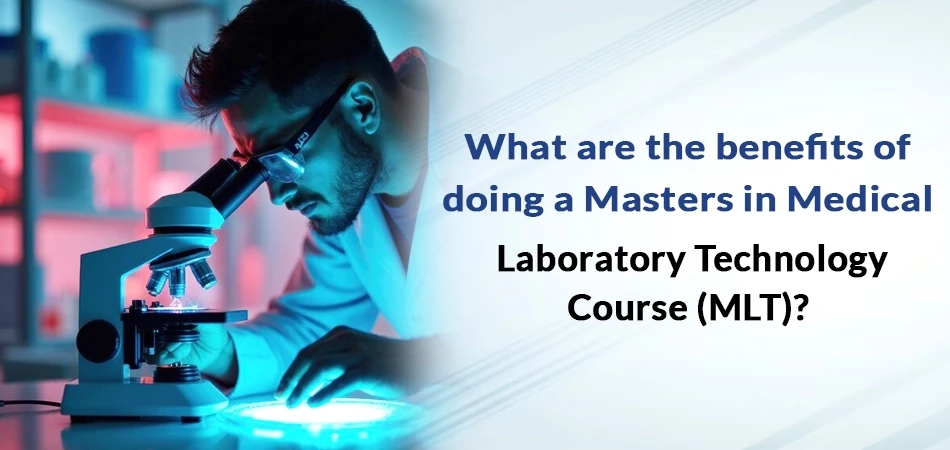What Are the Benefits of Doing a Masters in Medical Laboratory Technology Course (MLT)?

Overview
Master in Medical Laboratory Technology is done after a Bachelor of Medical Laboratory Technology. This is the master's programme that helps the student to specialise in medical laboratory testing and diagnosis protocols. The course is a specialised course for the students to get a hand on medical laboratory testing related to biochemistry, microbiology, haematology and other laboratory tests. This is a 2-year course and covers all the important aspects of laboratory testing and protocols related.
Overall this course will help to enhance your skills and precise your laboratory procedure to get correct and precise results. This degree will also increase the probability of the job and students can get a good package after attaining the degree.
Here are the benefits of a Master in Medical Laboratory Technology (MLT):
Enhancing the skills: This course will help to enhance the skills and knowledge. This will also give the platform to learn new and advanced techniques in the industry.
Vast Career Opportunities
This course provides vast job opportunities in ever ever-expanding healthcare industry. There are a lot of job opportunities in the healthcare industry and doing a master's in MLT makes you stand out for the job from the rest of the applicants.
Essential Skills
This programme helps the student to adopt the advanced and newly developed skills and techniques in the market. This is also important for gaining knowledge and new opportunities.
Competitive salary package
Masters MLT has a competitive salary advantage and makes the applicant stand out from the other candidates. Also, companies prefer higher qualifications and some positions have master's qualifications for eligibility.
Contribution to Healthcare
A Master MLT candidate can contribute to the healthcare industry with his skills and knowledge. This also adds to social service and working for the betterment of human health. Some people get satisfaction for the betterment of humans.
Specialization in Emerging Areas
The healthcare sector is continuously evolving, and there is a growing need for skills. A Master's in MLT often allows you to focus on areas such as molecular diagnostics, cancer diagnostics, immunoassays, or forensic science. Specializing in these emerging fields can make you a sought-after expert in the medical technology space.
Leadership and Managerial Roles
A Master’s in MLT often includes training in laboratory management, healthcare policies, and organizational leadership, preparing graduates for supervisory and administrative positions. You can take on roles such as laboratory manager, quality management officer, and even administrative roles in hospitals or healthcare institutions.
Global Opportunities
As healthcare evolves increasingly globalized, having a Master's degree in MLT can provide opportunities to perform in various healthcare sets worldwide. Countries with advanced healthcare systems often require highly skilled laboratory professionals to meet diagnostic demands, and a Master's degree can help you meet these requirements.
Enhanced Critical Thinking and Problem-Solving Abilities
The advanced coursework challenges learners to think critically and solve complex problems, essential skills in laboratory diagnostics and patient care. These skills can improve your decision-making abilities in high-pressure environments, such as clinical labs or emergency settings.
Networking and Professional Development
Master’s agendas often offer networking opportunities with professionals, experts, and faculty members in the field of laboratory technology. This can help you build connections and alliances with other specialists in the healthcare sector. Many programs offer internships or clinical rotations, allowing you to gain hands-on experience in leading healthcare institutions.
Job Security
The need for skilled medical laboratory specialists is growing due to an aging population, increasing prevalence of diseases, and advances in medical technologies. With a Master's in MLT, you evolve an essential part of the healthcare team, ensuring better job stability and prospects for long-term employment.
Clinical and Ethical Expertise
A Master's in MLT will provide an understanding of ethical issues, patient safety, and the importance of accurate diagnostics, helping you navigate complex clinical environments and possess high professional standards.
Conclusion:
A Master’s in Medical Laboratory Technology can greatly enhance your professional development, allowing you to specialize, assume leadership roles, and contribute to increasing the healthcare industry. Whether you’re interested in clinical practice, research, or laboratory management, the degree prepares you for a rewarding and impactful career.

